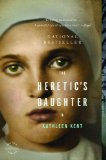Summary | Excerpt | Reading Guide | Reviews | Beyond the Book | Readalikes | Genres & Themes | Author Bio

A Novel
by Kathleen Kent
My mother, who was Martha Allen before marrying, sat next to him, holding Hannah, only one year old. She was wrapped into a shapeless bundle and held loosely like a package. I remember watching my little sister with the cruel fascination of a child, wondering when she would topple out of the wagon. We had lost a baby sister, Jane, years before and my lack of close affection could have been for fear that this baby would die as well. The first year was so fragile that some families did not name their child until the child was past twelve months and more likely to live. And in many house holds if a baby died, that same baby's name would be passed on to the next born. And to the very next if that babe died as well.
At times I suspected my mother had no tender feelings for any of us, even though we were as different from one another as children could be. Richard was very much like Father: tall, silent, and as impenetrable as the rocks in Boston Bay. Andrew, the next oldest, had been a sweet child and cheerfully willing to work, but as he grew, he stayed rather slow in thought and often my mother lost patience with him. Tom, the third son, was closest to me in years and closest to my heart. He was quick and bright, his humors running hot and restless like mine, but he was often afflicted with attacks of labored breathing and so, at the times of seasons' changing, had not much strength to work in the field or barn. I was next in age, stubborn and willful, I was often enough told, and thus not easily loved. I approached the world with suspicion, and because I was not pretty or pliable, I was not doted upon. I often challenged my betters and was therefore often chastised vigorously with a slotted spoon we children had named Iron Bessie.
It was my manner to openly stare at the people around me, despite knowing how this discomforted them, especially my mother. It was as though my staring robbed her of some essential part of herself, some part that she held in reserve even from those closest to her. There was hardly a time when we were not eating or sleeping or working together, and so we were expected to give quarter in this regard. She loathed my staring so greatly that she would work to catch me at it, and if I could not look away before she turned to me, she would use Iron Bessie on my back and legs until her wrist gave out. And as her wrists were as strong as any man's, this took some time. But in this way, I came to witness so much that others did not see. Or did not wish to see.
It was not defiance only that made me study her so, although our cat-and-mouse games did become a kind of battle. It was also because she, with a deliberation bordering on the unseemly, set herself apart from what a woman should be and was as surprising as a flood or a brush fire. She had a will, and a demeanor, as forceful as a church deacon's. The passage of time, and layer upon layer of misfortune, had only worked to stiffen the fabric of her being. At first glance, one might perceive a comely woman of some intelligence, not young, but neither yet old. And her face, when not animated by speech or untempered passions, seemed serene. But Martha Carrier was like a deep pond, the surface of which was placid enough but deeply cold to the touch and which was filled beneath the surface with sharp rocks and treacherous choke roots. And she had a tongue, the sharpness of which would gut a man as quick as a Gloucester fisherman could clean a lamprey eel. I know I was not alone in my family, or amongst our neighbors, in fervently praying for a beating rather than having to endure the lacerations of her speech.
As our wagon moved slowly past fields covered in deep drifts of encrusted snow, I looked expectantly about for farm houses or, better still, the sight of a garrison outpost or a gallows hill with the remains of ropes still dangling from broad- limbed oaks where the hangman had cut down the bodies. We speculated about how long the bodies would be left on the rope before public decency required them to be removed. In years to come children of a tender age would be kept away from the hangings, flailings, and public tortures of the honorable courts of New England. But I was yet in my innocence and thought such necessary instructions to be no more unpleasant than wringing the head from a chicken's neck. I had, from time to time, seen men and women in the stocks, and it had been great sport for my brothers and me to throw bits of refuse at their captive heads.
Copyright © 2008 by Kathleen Kent
Read the best books first, or you may not have a chance to read them at all.
Click Here to find out who said this, as well as discovering other famous literary quotes!
Your guide toexceptional books
BookBrowse seeks out and recommends the best in contemporary fiction and nonfiction—books that not only engage and entertain but also deepen our understanding of ourselves and the world around us.